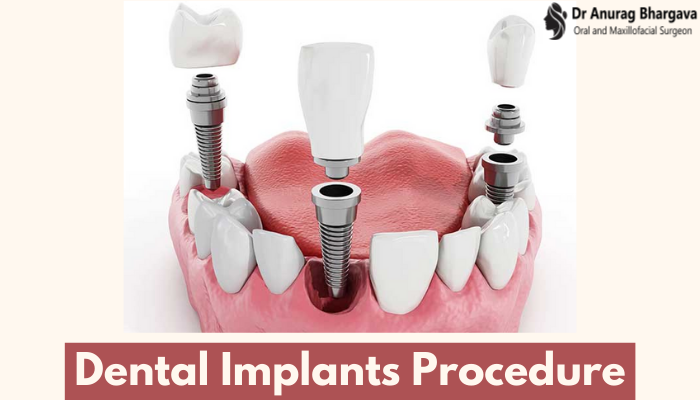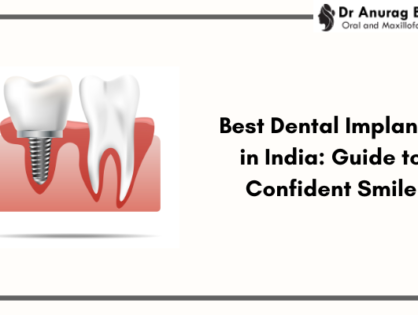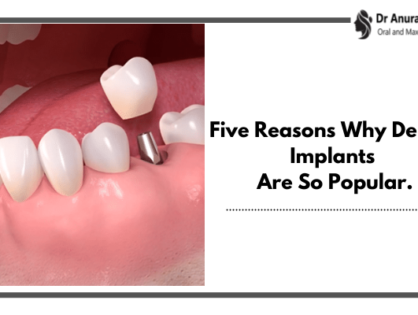Dental care has seen some major set of improvements over a decade, but still many of us suffer tooth loss due to periodontal diseases, tooth decays, injuries, or lack of regular care. Earlier bridges and dentures were the only dental treatments available for missing teeth, but with advancements in the field of dentistry, we now have Dental Implants procedure.
What are Dental Implants?
Dental implants are titanium screws or frames which replace the roots of missing teeth. They are surgically positioned into the jawbone. Once they are in place, dentists mount the replacement teeth over them. Dental implants feel and look just like your natural teeth.
Who can Get Dental Implants Treatment?
Dental Implants treatment is suggested by the dentists only when the condition of the jawbone is intact. The dentist performs multiple special tests to examine the amount of bone in your jaw and if it is not enough, or if it isn't healthy enough, it may not be possible to place implants without grafting bone into the area first.
Is it Really Important to Replace Missing Teeth?
Well, yes there are many reasons why you should replace missing teeth.
Complete set of teeth makes your smile even more confident. If your teeth are missing you might end up worrying about facing people. It also at times affects your speech which is again a major reason for your confidence.
Your jawbone starts dissolving when a tooth is lost. This leads to poor shape of your jaw and also loosens the grip of other teeth. Dental implants procedure replace your lost teeth and leave your remaining ones unaffected.
Chewing seems like a task if you have missing teeth. This is one of the major reasons why people have poor nutrition. Raw fruits and vegetables require more chewing.
Someone who finds it difficult to chew may avoid them. Other options, such as blending, pureeing and juicing, are not always considered.
Teeth loss also affects your entire bite which can further lead to problems associated with the temporomandibular joint.
What is the Cost of Dental Implants?
Dental Implant treatment starts from INR 15000 to INR 300000, depending on how many implants are needed and which type of prosthesis you need. Our unique treatment modalities give you quick results. We intend to offer long-lasting treatment with fewer visits. Our recent and successful services include “No teeth to all teeth in just 3 days”.
What are the Types of Dental Implants? Why are they Used?
There are two different types of dental implants procedures that are widely known:
Endosteal: It refers to an implant that’s placed directly in the bone. After the surgical wound has healed up a metal post is connected followed by a false tooth/ teeth.
Subperiosteal: It refers to an implant where a metal frame is fixed right underneath your gum tissue and once it’s healed the artificial teeth are mounted. These are no longer in use today because of their poor long-term results in comparison to Endosteal dental implants.
Dental Implants are not just for teeth replacement, they also help with other dental treatments like supporting dentures or bridges. When implants support removable dentures they provide stable, secured and comfortable fit. Along with these dental implants are of great use in orthodontic treatments. Dental mini-implants are used to move teeth to the desired position. These implants are of a temporary nature. They are small but are fixed to the bone to help with the orthodontic treatment. They are subsequently removed after their function has been served.
Dental implants are used for the “All-on-4” technique where a complete arch is fixed on just 4 implants. The position of these implants is decided as per the bone strength. This way full mouth rehabilitation has become an easy process.
What are the advantages of Dental Implants over other treatments?
Just like every dental treatment, dental implants are also very advantageous. They help with:
Better appearance. As the nature of Dental implants is permanent when fused with your jaw bone. They look and feel natural like your own teeth.
Improved speech. With other procedures like temporary dentures or bridges, there is the possibility of slipping or poor-fitting causing you to mumble or slur your words. Dental implants help you speak without the worry that teeth might slip.
Great comfort. Dental implants eliminate the embarrassing inconvenience of removing dentures as the titanium screw is fixed to your jaw topped with the false teeth, so the discomfort of a foreign body is also eliminated.
Easier eating. Dental implants function like your natural teeth. You can eat with confidence and without pain.
Improved self-esteem. Dental implants can complete your smile if you have missing teeth. This improves the levels of confidence and makes you feel better about yourself.
Oral Health. Dental implants don't need any support from adjacent teeth like dental bridges. This way your teeth are intact and have a better life. This in turn improves your oral health. They are also durable if the maintenance is done properly. With those appointments you also get your other teeth check regularly which helps maintain the overall oral health.
How are Dental Implants Placed?
Dental implants treatment is an individualised treatment. A team of professionals who are trained and experienced in restorative dentistry examine your mouth and perform specialised tests to identify the density of your bone. If you are a right fit for the treatment then a small titanium post is placed into the bone socket of your missing teeth. After it heals up, a connector post called abutment is fixed to hold the artificial tooth. The dentist then takes impressions of all your teeth and creates a model of your bite. Accordingly, a crown or the artificial tooth is moulded which is a perfect match of your natural teeth. Then the dentist fixes this crown to the abutment.
Dental Implants are fused to your jawbone and are a fixed solution to missing teeth. They provide stable support to the artificial teeth placed onto it. Since they are rooted in your jawbone they do not slip or shift which bring great comfort while talking and eating. This way they tend to feel more natural than conventional bridges or dentures.
Are Dental Implants Painful?
Dental implants are less painful than a tooth extraction. Most of our patients have undergone very little discomfort in the procedure. We give local anaesthesia while performing the procedure.
After the dental implants procedure, mild soreness can be treated with over-the-counter pain medications.
Is Dental Implants Procedure Safe and How Long do they Last?
Dental Implants procedure is completely safe if taken care of well. They are more like your natural teeth which require maintenance. If you do not take regular maintenance appointments they can also develop a coating similar to your natural teeth. Untreated and neglected implants often lead to gum infection, bleeding, soreness and general discomfort. You could also get all these problems with natural teeth.
If your implants are well looked after, and if the bone they are fitted to is strong and healthy, you can expect them to last for many years. However, there is no lifetime guarantee just like any other replacement surgeries.
Is Dental Implants Procedure really Successful?
Dental implant success depends upon the location of missing teeth, the jaw or bone strength of the candidate, oral habits of the candidate and any other medical conditions. If the candidate smokes or suffers from diabetes the bone generally deteriorates and thus the fit of implants loses. Your dentist can check the bone density and suggest whether implants is the right procedure for you.
Studies indicate that dental implants that are surgically placed in the roots are successful 90% of the time. If there are any problems with the implants the failure is seen in the very first year. Hardly a percent implants fail each year.
How can I Take Care of My Dental Implants?
Dental implants act just like your natural teeth. Good oral care will help increase their life. Regular brushing, flossing and dental maintenance visits to the dentist should be made. Smoking or eating too much sugar can create dental problems. If you are missing a tooth and believe a dental implant might be the right solution for you, start by consulting your dentist.
Post-Procedure Care for Dental Implants: Ensuring Long-Term Success
After undergoing a dental implant procedure, proper care is essential to ensure the long-term success and durability of your implants. Following the surgery, your dentist will provide specific instructions for maintaining oral hygiene and avoiding complications during the healing phase.
Immediate Care After Surgery
- Avoid consuming hot food and beverages for the first 24 hours.
- Refrain from smoking, as it can hinder the healing process.
- Use ice packs to reduce swelling and discomfort.
- Stick to soft foods and avoid chewing on the implant site until the area heals.
Long-Term Maintenance
- Brush twice daily using a soft-bristle toothbrush and non-abrasive toothpaste.
- Floss regularly with implant-safe dental floss to avoid plaque buildup around the implant.
- Use an antimicrobial mouthwash to maintain oral hygiene and prevent infections.
- Schedule regular dental check-ups for professional cleaning and to monitor the implant’s condition.
Potential Complications and How to Avoid Them
While dental implants have a high success rate, certain complications can occur, including infections, implant loosening, or gum recession. These issues can often be avoided through proper oral care and timely dental visits.
Lifestyle Factors Affecting Implant Longevity
- Diet: Avoid excessive sugar consumption, as it can promote bacterial growth.
- Oral Habits: Avoid habits like teeth grinding (bruxism) or using teeth as tools to open packages.
- Overall Health: Manage conditions like diabetes, as they can affect bone health and implant stability.
Conclusion
Dental implants are a reliable and long-lasting solution for missing teeth when cared for properly. By following your dentist's instructions and maintaining a healthy oral hygiene routine, you can ensure the success of your dental implants for years to come. If you have any concerns or questions about the procedure, don’t hesitate to consult your dental professional for personalized guidance.



